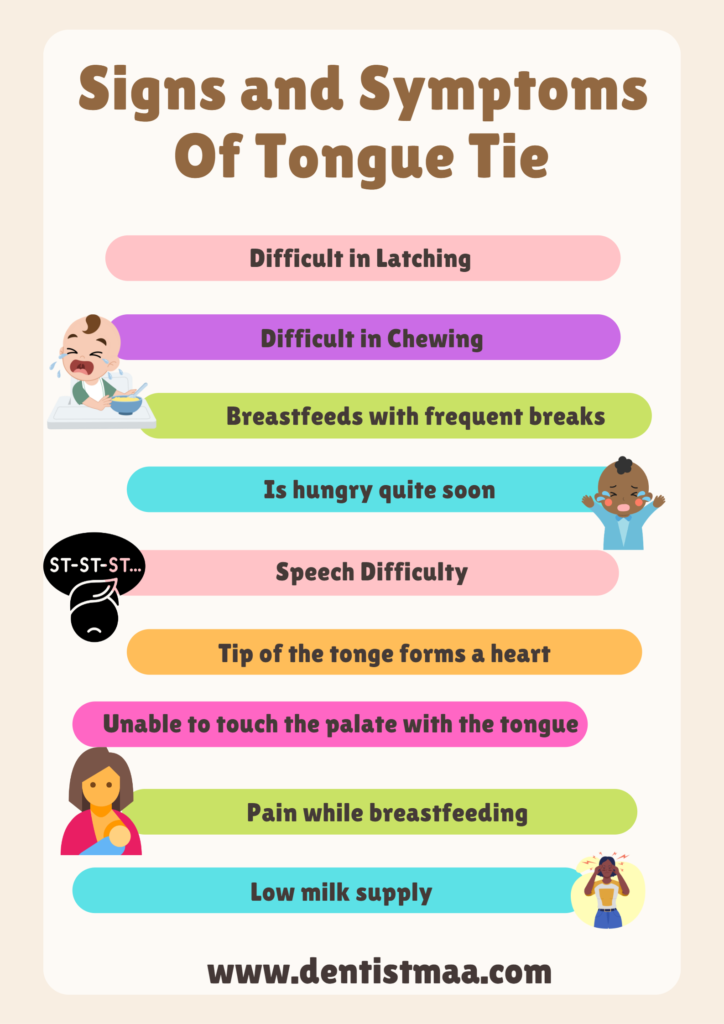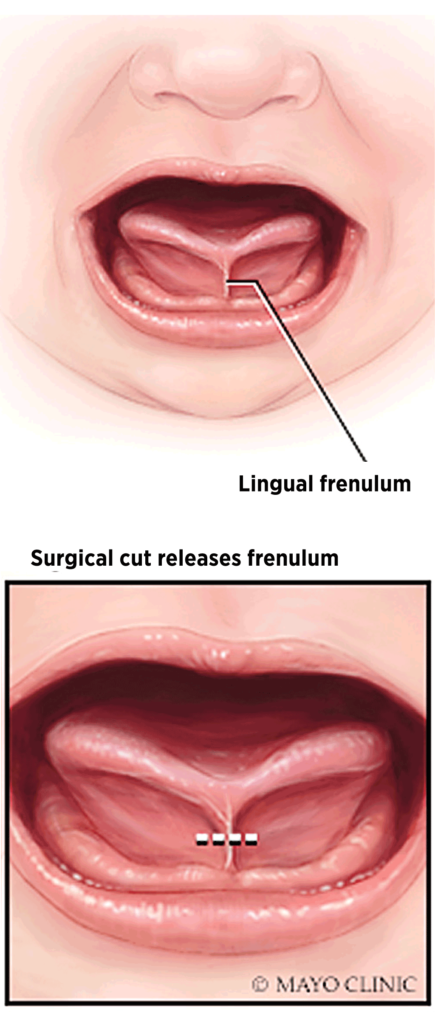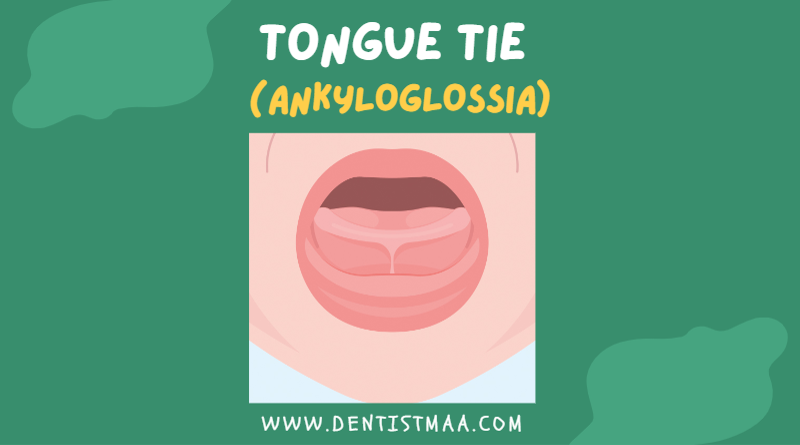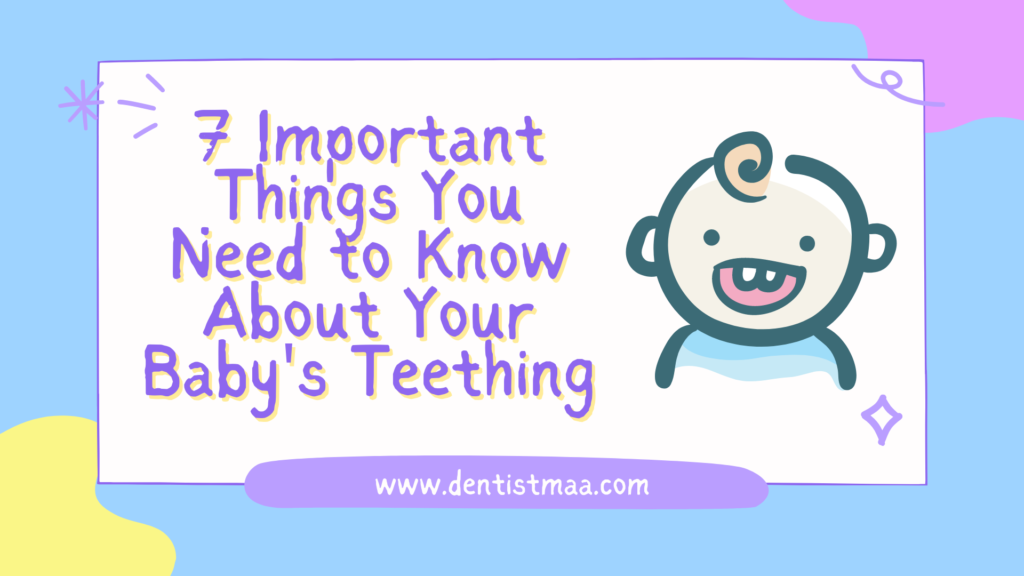Tongue Tie or Ankyloglossia though not so common, is seen in many new born and is some times a matter of concern for the parents. It doesn’t cause a lot of major problems and is easy to treat. Therefore it is not a very alarming condition and parents should not be worried much.
- What Is Tongue Tie?
- How Do You Get Tongue Tie?
- How Common Is Tongue Tie?
- How Is Tongue Tie Diagnosed?
- Signs and Symptoms of Tongue Tie?
- Does Tongue Tie Affect Speech?
- Does Tongue Tie Affect Breastfeeding?
- How Is Tongue Tie Treated?
- What Questions Should I Ask My Doctor?
- What Are The Complications Or Difficulties If My Child Has Tongue Tie?
- Which Doctor Should I Visit If My Child Has A Tongue Tie?
What Is Tongue Tie?
Tongue Tie also know as Ankyloglossia is a genetic condition where the tongue of the child is attached to the floor of the mouth, i.e. the child finds it difficult to raise the tongue and the movements are comparatively reduced. This is caused by a short lingual frenum (the tissue that attaches the tongue to the floor of the mouth).
So, the tongue can not move too much as it does normally. For some children it is completely fine and there is no problem at all, but for some there is difficulty in breastfeeding or in speech.
How Do You Get Tongue Tie?
Tongue tie is a congenital condition which means it runs in families. The lingual frenum which separates before the birth of the child sometimes doesn’t separate and therefore the child gets a tied tongue. The tongue tie might not be diagnosed at birth as it does not cause any major problems. It might be noticed at a later stage in life, or if the child is not breastfeeding properly or is not able to latch, your doctor might check the reason for it and it might be a ankyloglossia.
How Common Is Tongue Tie?
The prevalence of tongue tie varies from 2-20% as reported by ADA. The prevalence based on sex is not conclusive as the studies state differently.
How Is Tongue Tie Diagnosed?
Most of the times tongue tie is not looked at for when the child is born. But in case the child is having any difficulty in breastfeeding, your physician or your lactation specialist would be the first one to check for a tongue tie in the child’s mouth.
If the child is having a delayed speech then your speech therapist might be the one who would diagnose it. If it was not diagnosed at birth or in infancy, a dentist might be the one to diagnose it while a routine dental examination.
Related: Are Teething Tablets Safe For Babies?
Signs and Symptoms of Tongue Tie?
You might notice the following symptoms in your baby:
- Can not latch properly
- Does more of chewing motion than sucking
- Feeds for longer time with breaks
- Gets fussy during feeding
- Is hungry more often and cries
- Weight loss
- Unable to protrude the whole tongue out or touch the roof of the mouth
- ‘The tip of the tongue will look heart shaped when the child tries to protrude the tongue
- The front lower teeth might have gaps in between them
You might have these symptoms if your child has a ankyloglossia:
- Pain while breast feeding
- Low milk supply
- Sore nipples

Does Tongue Tie Affect Speech?
There are certain sounds in which we need our tongue to touch our palate when we speak. These sounds are “t”, “d”, “n”, “l”, “s”, “r” and “z”. The child might have difficulty in pronouncing these sounds. But it is not necessary. Some children have no speech difficulties at all, while others need to see a speech therapist.
In some cases, the child adjusts with the tongue tie and it doesn’t effect him or her at all. But few children need treatment to relieve the frenal attachment.
Does Tongue Tie Affect Breastfeeding?
A seal is required for breast feeding. If no seal, there won’t be suction, and if there is no suction the child won’t be able to take the breastfeed. There is a problem in the latch. So, it becomes a little difficult for the child to breastfeed. Also, the child will try to use his or her gums and tongue to suck, which might be painful for the mother.
At this time the lactation specialists come into the role. They can diagnose the problem and help you to get a proper latch.
Reduced breastfeeding can also cause reduced milk supply and gasping too much air, leading to aerophagia.

Related: Vomiting in kids all you need to know
How Is Tongue Tie Treated?
In some cases the child has absolutely no problem at all and in these cases treatment might not be needed. But some children have problems in feeding and even speaking. In such cases parents opt for treatment for their children.
Frenectomy is the treatment of choice and is a very simple procedure where the surgeon will release the tongue tie in the child by dissecting the frenal attachment. It is a day care procedure and just takes a few minutes. There are no much related complication with the procedure, but definitely there would be some amount of pain and discomfort after the surgery.

What Questions Should I Ask My Doctor?
- Is tongue tie the reason my child is not breastfeeding properly?
- Is frenectomy required for my child?
- If frenectomy is the option when should I get it done?
- How should I make sure my child gets the proper nutrition?
- How to prevent dental problems?
What Are The Complications Or Difficulties If My Child Has Tongue Tie?
If the child had not undergone any treatment there might be few problems:
- Breastfeeding: But tongue tie is not the only reason the child is not able to breast feed. Consulting a lactation specialist is the best thing to do.
- Speech Impairments: Again it is not necessary that every child with a tongue tie will have this problem.
- Dental Problems: As the tongue can not be moved around the teeth the food might get stuck at various places in the mouth causing decay. Drinking plenty of water and brushing and flossing well will help preventing decay.
Which Doctor Should I Visit If My Child Has A Tongue Tie?
Depending on the stage of the diagnosis you can visit:
- Pediatrician: When the child is a new born
- Lactation Specialist: When the child has trouble breastfeeding
- Speech Therapist: If the child is having trouble speaking
- Dentist: Once the child is older and you visit the dentist for a routine dental examination.
To book an Appointment with us you can click the link: www.32sparklets.com
Related: Oral Thrush (Oral Candidiasis)





Pingback: Fissured Tongue: All You Need To Know - DentistMaa
Tounge Tie , a myth and reality, and it’s treatment. Well explained